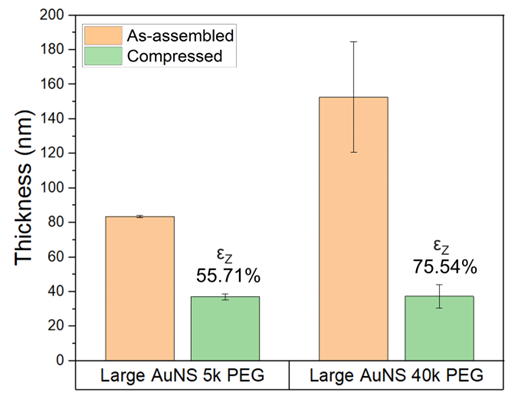Advantages:
- Consistent transformation of nanoparticles
- Scalable production method
- More efficient than traditional techniques
- Produces high-quality nanomaterials
Summary:
Efficient, scalable techniques to produce thin gold layers with controlled properties are essential for advanced applications in electronics, photonics, membrane filtration, crystals, catalysis, and medical devices. Traditional goldbeating methods are labor-intensive and not suitable for nanoscale dimensions.
This method adapts the ancient craft of goldbeating to the nanoscale by using gold nanoparticles subjected to solid-state uniaxial compression. This process creates ultrathin gold leaves with precise control over their properties, offering a scalable and versatile solution for advanced technological applications.

Thickness evolution and z-strain from the as-assembled to the compressed large AuNS with 5k PEG (close-packed) and 40k PEG (isolated). The represented data indicate an induced vertical out-of-plane z-strain (εZ) of 55.71 ± 0.1% (from 83.6 ± 0.7 nm to 37.0 ± 1.7 nm) for large AuNS with 5k PEG and 75.54 ± 0.1% (from 152.7 ± 32.1 nm to 37.3 ± 6.9 nm) for large AuNS with 40k PEG under applied normalized compressive stress.
Desired Partnerships:
- License
- Sponsored Research
- Co-Development